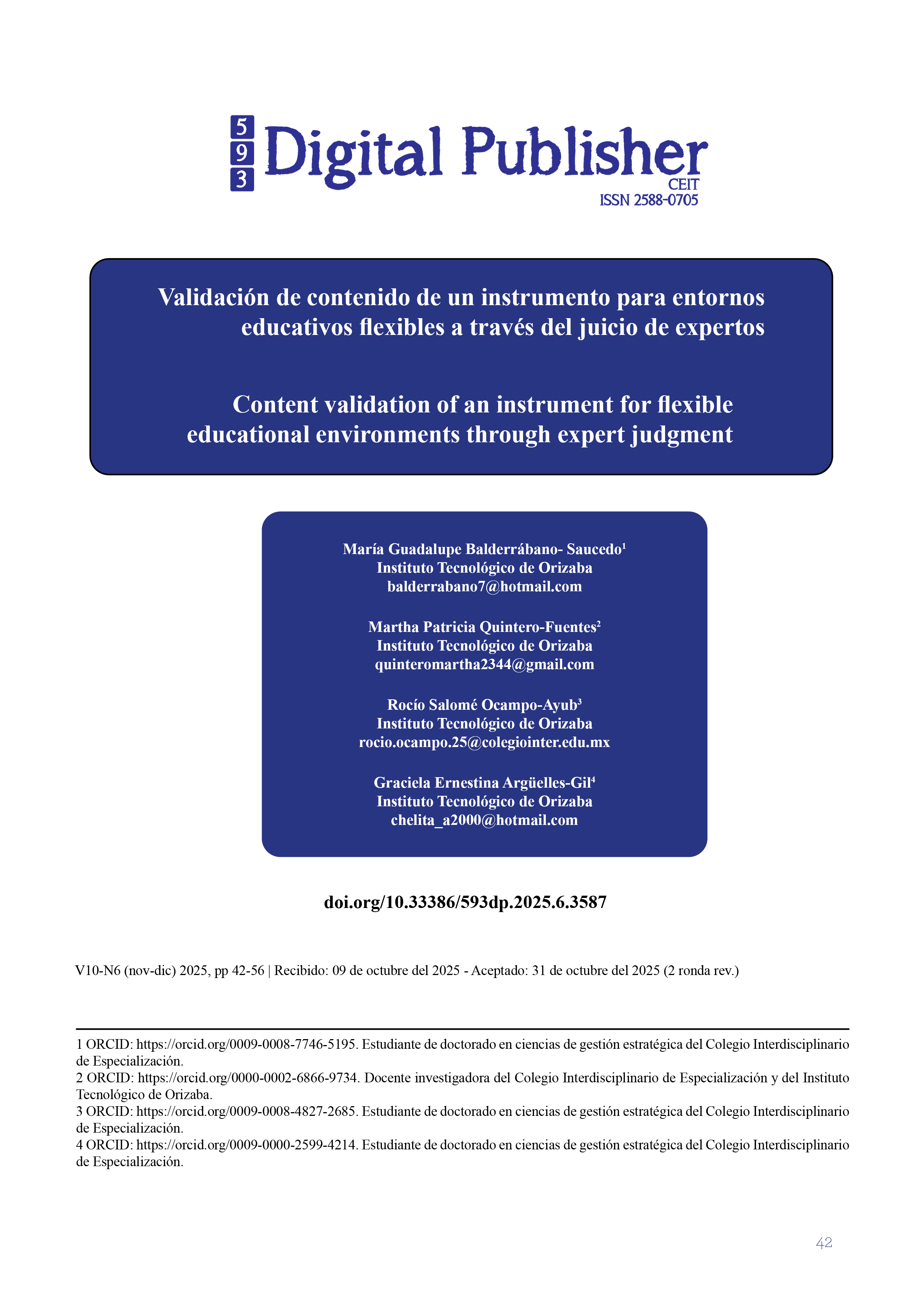Content validation of an instrument for flexible educational environments through expert judgment
Main Article Content
Abstract
This study reports the content validation of an instrument designed to evaluate flexible educational environments in technological higher education institutions. The validation process was conducted through expert judgment, applying three complementary techniques: the agreement index, binomial test, and Aiken’s V coefficient. The results show that most items obtained values between 0.80 and 1.00, indicating good to excellent content validity across the three methods employed. Consequently, the instrument is considered relevant, consistent, and reliable for use in research focused on educational management and flexibility in technological higher education. This methodological contribution strengthens the empirical assessment of educational flexibility, promoting the construction of valid measurement instruments and the generation of evidence to support the design of adaptive and inclusive institutional strategies in response to contemporary technological and contextual challenges.
Downloads
Article Details

This work is licensed under a Creative Commons Attribution-NonCommercial-ShareAlike 4.0 International License.
1. Derechos de autor
Las obras que se publican en 593 Digital Publisher CEIT están sujetas a los siguientes términos:
1.1. 593 Digital Publisher CEIT, conserva los derechos patrimoniales (copyright) de las obras publicadas, favorece y permite la reutilización de las mismas bajo la licencia Licencia Creative Commons 4.0 de Reconocimiento-NoComercial-CompartirIgual 4.0, por lo cual se pueden copiar, usar, difundir, transmitir y exponer públicamente, siempre que:
1.1.a. Se cite la autoría y fuente original de su publicación (revista, editorial, URL).
1.1.b. No se usen para fines comerciales u onerosos.
1.1.c. Se mencione la existencia y especificaciones de esta licencia de uso.
References
Aiken, L. R. (2021). Test psicológicos y evaluación (Undécima e). Pearson.
Amaya Pingo, P. M., Felix Poicon, E. C. L., Rojas Vargas, S., & Diaz Tito, L. P. (2020). Quality management: A study from its beginnings. Revista Venezolana de Gerencia, 25(90), 632–647. https://doi.org/10.37960/rvg.v25i90.32406
ANUIES. (2024). Anuario Estadístico de la Población Escolar en Educación Superior Ciclo Escolar 2023-2024. https://www.anuies.mx/informacion-y-servicios/informacion-estadistica-de-educacion-superior
Balderrama, J., Edel, R., & Galicia, L. (2017). Validez de contenido por juicio de expertos: propuesta de una herramienta virtual. Apertura, 9(2), 42–53.
Burbano Cerón, M. J., León Hernández, S. M., & Andrade Salazar, J. A. (2024). Impacto de las tecnologías de la información y la comunicación (TIC) en los procesos educativos: un estado del arte. Revista Docencia Universitaria, 5(1), 310–326. https://doi.org/10.46954/revistadusac.v5i1.114
Econ, C. (2024). Aprendizaje organizacional en instituciones de educación superior. Revista de Ciencias Sociales, XXX. https://doi.org/10.31876/rcs.v30i4.43044
Escobar-Pérez, J., & Cuervo-Martínez, Á. (2008). Validez De Contenido Y Juicio De Expertos: Una Aproximación a Su Utilización. Avances En Medición, 6(January 2008), 27–36.
Jey, D. E. G., & Barros Arrieta. (2020). Gestión del conocimiento en Instituciones de Educación Superior: Caracterización desde una reflexión teórica. Revista de Ciencias Sociales, XXVI(Vol. 26, Num. 3). https://doi.org/10.31876/rcs.v26i3.33235
Escurra Mayaute, L. M. (1988). Cuantificación de la validez de contenido por criterio de jueces. Pumiflcia Universidad Catúllca Del Perú, 6(Revista De Psicología), 103–111. https://doi.org/https://doi.org/10.18800/psico.198801-02.008
Guilford, J. P. (1954). Psychometric Methods (Second Edi). McGRAW-HILL BOOK COMPANY, INC. https://dn721507.ca.archive.org/0/items/in.ernet.dli.2015.459761/2015.459761.Psychometric-Methods.pdf
Hernández-Sampieri, R., Fernández-Collado, C., & Baptista-Lucio, P. (2014). Metodología de la Investigación (McGRAW-HILL, Ed.; Sexta).
Hoel, P. G. (1971). Introduction To Mathematical Statistics (John Wiley & Sons, Ed.; 4th Ed). https://es.scribd.com/document/721406571/Hoel-Paul-G-1971-Introduction-to-Mathematical-Statistics-4th-Ed
Llanes-Castillo, A. (2023). 1. Validación de instrumento sobre actitudes de médicos 2023. Revista De Ciencias Sociales, 2(XXIX), 186–198.
Marchesi, A., Tedesco, J. C., & Coll, C. (2011). Calidad , equidad y reformas en la enseñanza Calidad , equidad y reformas en la enseñanza.
Méndez-Giménez, A., Carriedo Cayón, A., & Pallasá Manteca, J. M. (2025). Diseño y validación del Cuestionario de Percepción de Intervenciones con Material Autoconstruido en Educación Física. Aula Abierta, 54(2), 229–236. https://doi.org/10.17811/rifie.21727
Merino-Soto, C. (2018). Confidence interval for difference between coefficients of content validity (Aiken’s V): A SPSS syntax. Anales de Psicologia, 34(3), 587–590. https://doi.org/10.6018/analesps.34.3.283481
Montalván-Vélez, C. L., Mogrovejo-Zambrano, J. N., Rodríguez-Andrade, A. E., & Andrade-Vaca, A. L. (2024). Adopción y Efectividad de Tecnologías Emergentes en la Educación desde una Perspectiva Administrativa y Gerencial. Journal of Economic and Social Science Research, 4(1), 160–172. https://doi.org/10.55813/gaea/jessr/v4/n1/92
Muñiz, J., & Fonseca-Pedrero, E. (2019). Ten steps for test development. Psicothema, 31(1), 7–16. https://doi.org/10.7334/psicothema2018.291
Naciones Unidas. (2023). Informe de los Objetivos de Desarrollo Sostenible. United Nations Publications. https://doi.org/10.18356/9789210056106c012
Nitin Liladhar Rane, Saurabh P. Choudhary, J. R. (2024). Development of a Fuzzy Likert Scales to Measure Variables in Social Sciences. Peer Reviewd, 09(5), 7352–7363.
Prieto, G., & Delgado, A. R. (2010). Fiabilidade e Validez. Papeles Del Psicólogo, 30(1), 67–74. http://www.cop.es/papeles
Reidl-Martínez, L. M. (2013). Investigación en educación médica. Investigación En Educación Médica, 2(6), 107–111. http://www.scielo.org.mx/scielo.php?script=sci_arttext&pid=S2007-50572013000200007
Sacón Caicedo, A. G., Solórzano Calderón, M. J., & Delgado Cedeño, M. F. (2024). Entornos Virtuales y su Rol Motivador en el Proceso de Enseñanza Aprendizaje en Educación Superior. Ciencia Latina Revista Científica Multidisciplinar, 8(1), 9502–9523. https://doi.org/10.37811/cl_rcm.v8i1.10270
SEP/TecNM. (2024). Modelo Educativo del Tecnológico Nacional de México. Humanismo para la Justicia Social (p. 146).
Sidney Siegel, A. J. (1985). Estadistica No Parametrica. In Angewandte Chemie International Edition, 6(11), 951–952.
Suárez, A. E. G., Franco, A. del R. L., Prieto, A. G. V., Reyna, M. J. M., Guijarro, M. J. A., & Cobos, M. L. P. (2024). Estrategias psicopedagógicas para la mejora de la resiliencia académica en estudiantes de secundaria. South Florida Journal of Development, 5(6), e3983. https://doi.org/10.46932/sfjdv5n6-002
UNESCO. (2023). UNESCO. Lo Más Destacado de La Educación En 2023: Mantener El Impulso Para Transformar El Aprendizaje. https://www.unesco.org/es/articles/lo-mas-destacado-de-la-educacion-en-2023-mantener-el-impulso-para-transformar-el-aprendizaje





